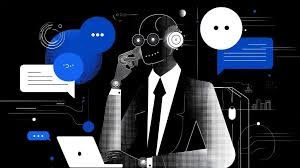
ChatGPT and the Future of AI Assistants: How AI is Transforming Work and Life
ChatGPT and Beyond: The Future of AI Assistants
Artificial Intelligence (AI) has transformed the way we live, work, and communicate, and AI assistants have become one of the most visible expressions of this technological revolution. Among them, ChatGPT, developed by OpenAI, has captured global attention for its ability to understand and generate human-like text, making it a powerful tool for businesses, students, and individuals alike. But as AI continues to evolve, what does the future hold for ChatGPT and AI assistants at large? Let’s explore.
The Rise of AI Assistants
AI assistants are software programs designed to perform tasks or services based on commands or questions. Early AI assistants, such as Siri, Alexa, and Google Assistant, primarily focused on voice recognition, information retrieval, and simple task execution. They were useful for basic queries, reminders, or controlling smart devices. However, the limitations were clear—these assistants struggled with complex tasks, nuanced conversations, or understanding context beyond their pre-programmed capabilities.
Enter ChatGPT. Unlike traditional AI assistants, ChatGPT leverages advanced natural language processing (NLP) and machine learning to understand context, generate coherent responses, and even engage in multi-turn conversations. Users can ask complex questions, seek creative ideas, or request professional-level content creation, all in a conversational manner. This has opened up new possibilities for AI in education, business, healthcare, entertainment, and beyond.
How ChatGPT Works
At its core, ChatGPT is based on a type of deep learning model called a Transformer, which excels in processing sequential data like text. Through a method called “training,” the model learns patterns in language from a massive dataset of books, articles, websites, and more. When a user inputs a query, ChatGPT predicts and generates the most likely response, making it appear remarkably intelligent.
Additionally, ChatGPT has been fine-tuned using Reinforcement Learning from Human Feedback (RLHF), where human evaluators guide the model to produce helpful and accurate outputs. This iterative process allows the AI to align more closely with human expectations, making interactions smoother and more meaningful.
Applications of ChatGPT
The applications of AI assistants like ChatGPT are expanding rapidly:
-
Customer Support: Companies use ChatGPT to provide instant responses to customer queries, improving service efficiency and reducing wait times. Unlike scripted chatbots, ChatGPT can handle diverse queries with flexibility.
-
Content Creation: Writers, marketers, and educators use ChatGPT to draft articles, blogs, reports, and lesson plans. It helps generate ideas, edit text, and even produce creative content like poetry or stories.
-
Learning and Education: AI assistants can tutor students, explain complex topics, and provide instant feedback. ChatGPT’s conversational style makes learning more engaging and personalized.
-
Healthcare Assistance: While not a replacement for professional medical advice, AI can assist healthcare providers in summarizing patient information, suggesting possible conditions based on symptoms, or providing educational content to patients.
-
Business Analytics: AI assistants can summarize reports, analyze data trends, and assist in decision-making processes, providing executives with actionable insights quickly.
The Future of AI Assistants
The future of AI assistants goes beyond simple conversation. Emerging trends suggest a future where AI will become more personalized, adaptive, and embedded in our daily lives:
-
Contextual Awareness: Future AI assistants will better understand context, emotions, and intent. They will remember prior interactions, adapt to user preferences, and provide more relevant recommendations over time.
-
Multi-Modal Abilities: Next-generation AI assistants will process not just text, but images, audio, video, and even real-world sensor data. Imagine an AI that can analyze a photo, provide insights, and suggest actions—all within the same interaction.
-
Integration with Smart Environments: AI will seamlessly integrate with homes, workplaces, and cities. Smart assistants will manage schedules, control devices, optimize energy usage, and enhance security autonomously.
-
Enhanced Collaboration: AI assistants will collaborate with humans more effectively, functioning as co-workers, advisors, or creative partners. They will assist in brainstorming, project management, and strategic planning with minimal supervision.
-
Ethical AI and Trust: As AI becomes more powerful, ensuring transparency, fairness, and privacy will be critical. Future AI assistants will need ethical frameworks to avoid biases, protect sensitive data, and provide trustworthy guidance.
-
Autonomous Agents: Beyond simple responses, AI assistants may evolve into autonomous agents capable of taking actions on behalf of humans. From booking appointments to negotiating deals, AI could execute tasks proactively while adhering to defined goals and preferences.
Challenges Ahead
Despite the exciting potential, the path forward is not without challenges:
-
Accuracy and Reliability: AI assistants can still produce incorrect or misleading information. Ensuring reliability is crucial, especially in professional or healthcare contexts.
-
Privacy Concerns: Handling personal data responsibly is essential. Users must trust that AI will not misuse sensitive information.
-
Overdependence: Relying too heavily on AI may diminish human problem-solving and critical thinking skills.
-
Ethical Use: Balancing automation with human oversight and maintaining ethical standards is an ongoing concern for AI developers and regulators.
Preparing for an AI-Driven World
To make the most of AI assistants, individuals and organizations should:
-
Learn to Collaborate with AI: Understanding the strengths and limitations of AI helps humans leverage it effectively rather than being replaced by it.
-
Focus on Creativity and Critical Thinking: While AI can handle repetitive or analytical tasks, human creativity, judgment, and empathy remain irreplaceable.
-
Stay Updated on AI Trends: Continuous learning about AI capabilities, tools, and regulations is essential to remain competitive.
-
Promote Responsible AI Use: Ensuring ethical implementation, transparency, and fairness should be a priority for all users and developers.
Conclusion
ChatGPT and similar AI assistants represent a monumental shift in how humans interact with technology. They offer unparalleled opportunities for efficiency, creativity, and innovation. As these tools become smarter, more personalized, and context-aware, they will redefine education, business, healthcare, and daily life. The journey of AI assistants is just beginning, and the possibilities are limited only by our imagination and ethical foresight. By embracing AI thoughtfully, we can create a future where humans and machines collaborate seamlessly to achieve extraordinary outcomes.
FAQs
1. How is ChatGPT different from other AI assistants like Siri or Alexa?
Unlike traditional AI assistants that rely on pre-programmed commands, ChatGPT uses advanced natural language processing to understand context and generate human-like responses. It can handle complex queries, multi-turn conversations, and provide content creation support, making it more versatile and intelligent.
2. Can AI assistants like ChatGPT replace human jobs?
AI can automate repetitive tasks, provide insights, and assist in decision-making, but it cannot fully replace human creativity, judgment, and emotional intelligence. Instead, AI is best used as a collaborative tool to enhance human productivity.
3. What is the future of AI assistants in daily life?
Future AI assistants will be context-aware, multi-modal, and capable of proactive decision-making. They will integrate into smart homes, workplaces, and cities, assisting with personal tasks, professional projects, and creative endeavors while maintaining ethical standards.




